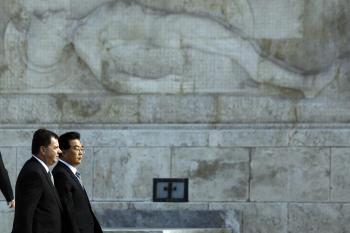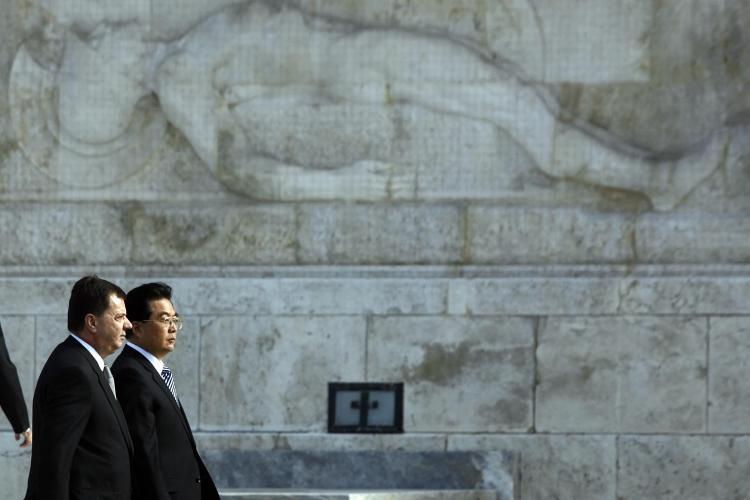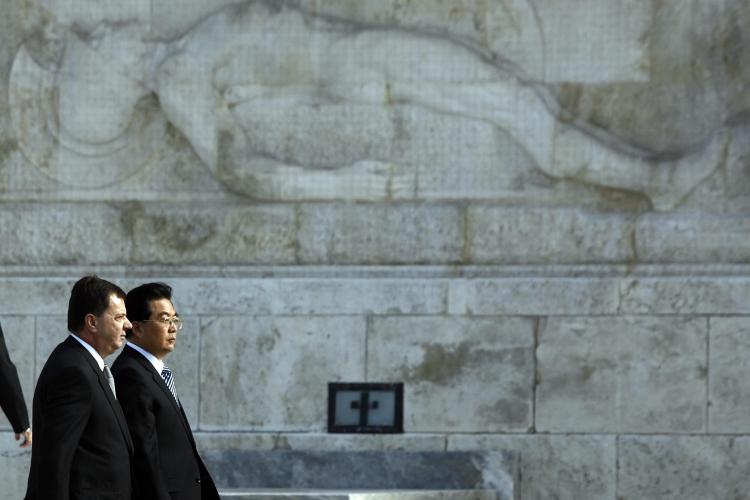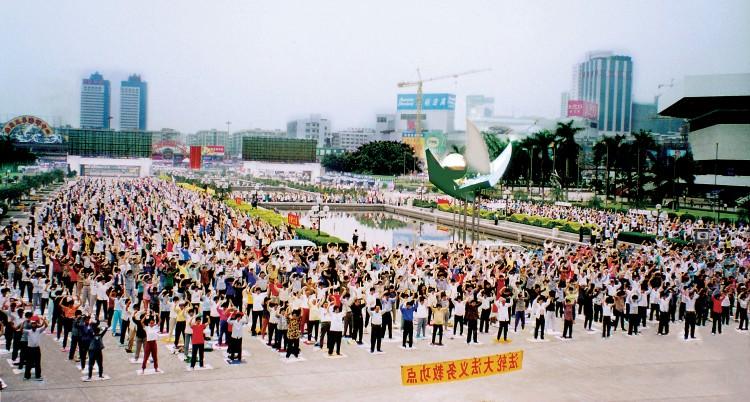China’s paramount leader, Hu Jintao, is scheduled to attend a Nuclear Security Summit April 12-13 in Washington, D.C. The actions of the Obama administration surrounding this visit as well as the speculations reported in the press show a misunderstanding of the views of Hu Jintao and the leaders of the Chinese regime.
Hu’s attendance, which was only announced on April 1, has been reported as representing a warming of U.S.-China relations.
Those relations had been tested by a U.S. arms sale to Taiwan, a meeting at the White House of President Obama and the Dalai Lama, and growing pressure by the Obama administration on the Chinese regime to allow its currency to appreciate.
The value of the Chinese yuan, which some experts believe is undervalued by 40 percent, makes imports into China more expensive and Chinese exports more affordable, helping to account for the huge trade surpluses China piles up in trade with the United States. Four U.S. senators are pushing a bill that would label China as a currency manipulator and request economic sanctions against China.
On April 3, Treasury Secretary Timothy Geithner announced that a report originally due on April 15 on whether China is engaged in currency manipulation would be delayed. The delay has prompted various speculations.
Did Treasury delay issuing the report in order to save face for Hu, so that he would not be embarrassed by a challenge from the United States immediately after his participation in the summit?
Was the delay designed to give the Chinese regime some time to adjust its currency upward?
Was the delay part of a deal to get the Chinese regime on board for the effort to put new sanctions on the Iranian nuclear weapons program? The White House has denied any such connection, although the denials have not convinced observers.
The thinking behind each of these speculations misunderstands the real motives of the leaders of the Chinese regime.
They could not care less about congressional pressure on China’s currency policies or about China being formally named a currency manipulator. They surely want to avoid sanctions, but they don’t believe the U.S. government is prepared to endure the pain sanctions imposed on China would cause Americans.
The Chinese leadership’s top concern is the regime’s own domestic stability and the power of the communist party. The Chinese Communist Party only holds its members together through shared economic interests, and economic growth is the party’s life support. The leadership will avoid any risk that might slow down China’s economic development and increase unemployment.
Moreover, domestic unrest happens every day in today’s China. Merely labeling China a currency manipulator will not quell unrest or make the regime weaker. But appreciating the yuan will increase unemployment and unrest and threaten the regime’s survival.
In the days to come, one can expect the regime to engage in endless talks and negotiations and excuses. For example, Chinese Premier Wen Jiabao recently declared that China has over 200 million people unemployed—it could not possibly be expected to allow the value of its currency to rise.
Hu attending the summit next week is normally thought of as a concession to the Obama administration. In fact, Hu has not conceded anything. Once here, he may still continue to show displeasure over the Taiwan arms sales and Obama’s meeting with the Dalai Lama.
Hu came not to concede to U.S. power but to exercise Chinese power. He wants to claim the international stage and let the United States know the world has changed. On the issue of Iran, everyone is trying to win the Chinese regime’s support. In recent months, Beijing has received delegations from Israel, Iran, Europe, and the United States.
Hu will appear to be friendly and cooperative regarding the issue of sanctions on Iran. However, the Chinese regime has supported Iran’s nuclear program with the sales of key technologies for at least a decade and Iran is China’s third biggest oil supplier.
Moreover, the threat of an Iranian bomb is a huge distraction for the United States that helps prevent it from focusing on other strategic priorities, such as the rising power of China. The case of Iran is very similar to the Chinese client state of North Korea. The Chinese regime benefits by participating in endless talk about Iran, while developments on the ground continue to move forward, just as it continues to benefit from endless talks about North Korea.
In the end, any agreement the Chinese regime reaches about sanctions on Iran with the United States will be toothless.
Hu Jintao is coming to the summit to play Tai Chi, resolving pressure by gently yielding while defeating the enemy using its own force.
Why the United States government should want to play the Chinese game is not clear. Rather than speculating on what Chinese leaders are thinking and condescending to them with the thought that the Chinese regime might be embarrassed by a statement of the facts, U.S. leaders should speak directly and honestly. If China is manipulating currency, they should say so and back up their words with actions.
Hu’s attendance, which was only announced on April 1, has been reported as representing a warming of U.S.-China relations.
Those relations had been tested by a U.S. arms sale to Taiwan, a meeting at the White House of President Obama and the Dalai Lama, and growing pressure by the Obama administration on the Chinese regime to allow its currency to appreciate.
The value of the Chinese yuan, which some experts believe is undervalued by 40 percent, makes imports into China more expensive and Chinese exports more affordable, helping to account for the huge trade surpluses China piles up in trade with the United States. Four U.S. senators are pushing a bill that would label China as a currency manipulator and request economic sanctions against China.
On April 3, Treasury Secretary Timothy Geithner announced that a report originally due on April 15 on whether China is engaged in currency manipulation would be delayed. The delay has prompted various speculations.
Did Treasury delay issuing the report in order to save face for Hu, so that he would not be embarrassed by a challenge from the United States immediately after his participation in the summit?
Was the delay designed to give the Chinese regime some time to adjust its currency upward?
Was the delay part of a deal to get the Chinese regime on board for the effort to put new sanctions on the Iranian nuclear weapons program? The White House has denied any such connection, although the denials have not convinced observers.
The thinking behind each of these speculations misunderstands the real motives of the leaders of the Chinese regime.
They could not care less about congressional pressure on China’s currency policies or about China being formally named a currency manipulator. They surely want to avoid sanctions, but they don’t believe the U.S. government is prepared to endure the pain sanctions imposed on China would cause Americans.
The Chinese leadership’s top concern is the regime’s own domestic stability and the power of the communist party. The Chinese Communist Party only holds its members together through shared economic interests, and economic growth is the party’s life support. The leadership will avoid any risk that might slow down China’s economic development and increase unemployment.
Moreover, domestic unrest happens every day in today’s China. Merely labeling China a currency manipulator will not quell unrest or make the regime weaker. But appreciating the yuan will increase unemployment and unrest and threaten the regime’s survival.
In the days to come, one can expect the regime to engage in endless talks and negotiations and excuses. For example, Chinese Premier Wen Jiabao recently declared that China has over 200 million people unemployed—it could not possibly be expected to allow the value of its currency to rise.
Hu attending the summit next week is normally thought of as a concession to the Obama administration. In fact, Hu has not conceded anything. Once here, he may still continue to show displeasure over the Taiwan arms sales and Obama’s meeting with the Dalai Lama.
Hu came not to concede to U.S. power but to exercise Chinese power. He wants to claim the international stage and let the United States know the world has changed. On the issue of Iran, everyone is trying to win the Chinese regime’s support. In recent months, Beijing has received delegations from Israel, Iran, Europe, and the United States.
Hu will appear to be friendly and cooperative regarding the issue of sanctions on Iran. However, the Chinese regime has supported Iran’s nuclear program with the sales of key technologies for at least a decade and Iran is China’s third biggest oil supplier.
Moreover, the threat of an Iranian bomb is a huge distraction for the United States that helps prevent it from focusing on other strategic priorities, such as the rising power of China. The case of Iran is very similar to the Chinese client state of North Korea. The Chinese regime benefits by participating in endless talk about Iran, while developments on the ground continue to move forward, just as it continues to benefit from endless talks about North Korea.
In the end, any agreement the Chinese regime reaches about sanctions on Iran with the United States will be toothless.
Hu Jintao is coming to the summit to play Tai Chi, resolving pressure by gently yielding while defeating the enemy using its own force.
Why the United States government should want to play the Chinese game is not clear. Rather than speculating on what Chinese leaders are thinking and condescending to them with the thought that the Chinese regime might be embarrassed by a statement of the facts, U.S. leaders should speak directly and honestly. If China is manipulating currency, they should say so and back up their words with actions.






